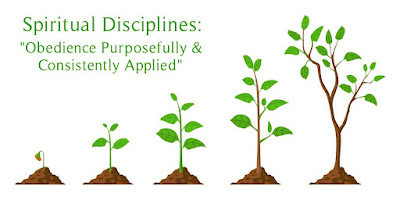The best things in life are free but you can give them to the birds and bees.
I need money. (That's what I want.)
That's what I want. (That's what I want.)
Your love gives me such a thrill but your love don't pay my bills.
Money don't get everything, it's true. But what it don't get, I can't use.
Now give me money! (That's what I want.)
That's what I want.
Well, as you might suppose, we took a bit different tack in last week's Sunday School class that I've been teaching on spiritual disciplines. Following is a review of that class. I hope you find it of value.
--------------------------------------------------------
The spiritual disciplines related to stewardship must find their start in an “attitude of gratitude” or, to put it another way, note that even with the word itself “giving” will always be a part of “thanksgiving”. Indeed, a recognition that God’s blessings on His children are bountiful, constant, and forever provides not only a foundation for praise and appreciation, but also a motivation for us to follow His commands to be generous, purposeful, and happy in our giving to others.
G.K. Chesterton observed that a lack of gratitude is the root of all sin. An exaggeration? Not if you consider that Romans 1:21-32 underscores the same profound reality. Living a life of thanksgiving then is of paramount importance. We recognize God as the source of all that we have and we express our thankfulness to Him in both word and deed.
“I will give thanks to the Lord with all my heart; I will tell of all Your wonders. I will be glad and exult in You; I will sing praise to Your name, O Most High.” (Psalm 9:1,2)
“I shall wash my hands in innocence and I will go about Your altar, O Lord, that I may proclaim with the voice of thanksgiving and declare all Your wonders.” (Psalm 26:6,7)
“Enter His gates with thanksgiving and His courts with praise. Give thanks to Him,
bless His name. For the Lord is good; His lovingkindness is everlasting and His faithfulness to all generations.” (Psalm 100:4,5)
“But I will sacrifice to You with the voice of thanksgiving. That which I have vowed I will pay. Salvation is from the Lord.” (Jonah 2: 9)
Note in the Scriptures above (and so many others) how thanksgiving is linked to a devotion to testify to God’s wonders, to the loving kindness and faithfulness of God, and to our willingness to live a sanctified life. Thanksgiving is certainly a foundation for our effective discipleship. In fact, as our awareness of God’s character grows and our appreciation of His innumerable blessings to us increases, we become closer to those faithful stewards that Jesus describes in His parables.
Randy Alcorn describes a steward as “someone an owner entrusts with the management of his assets.” And the first thing to understand in this excellent definition is God’s ownership of absolutely everything – all of nature, all in the angelic realms, and even everyone of us.
“The earth is the Lord’s, and all it contains, the world and those who dwell in it.” (Psalm 24:1)
“Behold, to the Lord your God belong heaven and the highest heavens, the earth and all that is in it.” (Deuteronomy 10:14)
“So David blessed the Lord in the sight of all the assembly; and David said, ‘Blessed are You, O Lord God of Israel our father, forever and ever. Yours, O Lord, is the greatness and the power and the glory and the victory and the majesty, indeed everything that is in the heavens and the earth; Yours is the dominion, O Lord, and You exalt Yourself as head over all. Both riches and honor come from You, and You rule over all, and in Your hand is power and might; and it lies in Your hand to make great and to strengthen everyone. Now therefore, our God, we thank You, and praise Your glorious name. But who am I and who are my people that we should be able to offer as generously as this? For all things come from You, and from Your hand we have given You. For we are sojourners before You, and tenants, as all our fathers were; our days on the earth are like a shadow, and there is no hope. O Lord our God, all this abundance that we have provided to build You a house for Your holy name, it is from Your hand, and all is Yours.’” (1 Chronicles 29: 10-16)
“Who has given to Me that I should repay him? Whatever is under the whole heaven is Mine.” (Job 41:11)
“Or do you not know that your body is a temple of the Holy Spirit who is in you, whom you have from God, and that you are not your own? For you have been bought with a price: therefore glorify God in your body.” (1 Corinthians 6:19,20)
God owns it all. He created it all. He sustains it all. Furthermore, God’s graciousness and generosity is so abounding that we could never “out-give” Him.
“Do not be deceived, my beloved brethren. Every good thing given and every perfect gift is from above, coming down from the Father of lights, with whom there is no variation or shifting shadow.” (James 1:17,18)
“He who did not spare His own Son, but delivered Him over for us all, how will He not also with Him freely give us all things?” (Romans 8:32)
No, God blesses us with more than we can count, more than we can imagine, much more that we could ever give back to Him. And yet this Almighty God invites you and me to participate in His holy service to the world as His honored stewards. He gives us the responsibility of managing His assets and, as those parables Jesus teaches so clearly emphasize, God wants us to exercise these elements of the good steward: humility; understanding always that the assets are God’s, not ours; wisdom; generosity; industriousness; vision; skill; and gratitude. Furthermore, we are to never forget our accountability to the Master. And to anticipate that He is returning to evaluate (and, when it is called for, reward) our performance.
Obviously, our stewardship responsibilities involve what we do with God’s money. But we must wisely manage and invest all else He has given us as His disciples. Time. Talents and spiritual gifts. Opportunities. Relationships. Passions and priorities. And yes, money too.
Did you know that the Bible actually talks more about money (especially, our attitudes towards it) than about the topics of heaven or hell or the gospel? It’s true. But, although that’s an important study, with the short space we have in this class, let me point you to three Scriptures I think are especially relevant. In Acts 20:35 the apostle Paul quotes Jesus as saying, “It is more blessed to give than to receive.” That simple statement, buttressed by His many other teachings on giving, greed, simplicity of life, the snare of wealth, and so on reminds us of how important it is to be generous in our giving. And to give with ongoing trust in Christ’s care for us and the rewards He is storing up for us in heaven for the generosity we show now. It’s also noteworthy that the context of Paul’s remarks includes the priority of helping the needy and the need for industriousness and sacrifice so that the giver can do so more abundantly.
Luke 11:42 has important warnings about our giving too as Jesus sharply rebukes the Pharisees for alms-giving out of all the wrong motives. “But woe to you Pharisees! For you pay tithe of mint and rue and every kind of garden herb, and yet disregard justice and the love of God; but these are the things you should have done without neglecting the others.” These hypocritical false teachers were giving to impress God, to earn His favor, and to show off to others. But Jesus shows here (and in many other instances) that He demanded giving that was pure of heart, generous, relevant to the greatest needs, and directed ultimately to Him. Only such gifts would find heavenly rewards.
And then there is the wonderfully revealing Chapter 9 of 2 Corinthians. Read it carefully and you’ll note that there are several things to learn and follow. For instance, generosity should be carefully planned. Our giving should be bountiful even as we can rely on God to be bountiful in His giving to us. The target of giving in this case was Christians who were experiencing severe needs; we should observe that same priority in our giving. Giving must always beware of the lurking temptations of covetousness and pride. And only that giving which comes from a pure heart will glorify God.
And one more item. Included in that chapter (verse 7) is one of the most helpful exhortations in this matter. The Greek word translated “cheerful” here is “hilaros” and while it doesn’t mean rip-roaring hilarity, it does signify a joyful, readiness of mind. Thus, God loves the giver who is careful but prompt, who isn’t stingy, who isn’t boastful. Rather, the Lord loves the giver who understands that, when all is said and done, he is but a faithful steward of God’s assets, investing them for the Father’s use and in view of heavenly rewards.
The class concluded with a few additional guidelines about giving.
* Never forget that the steward’s giving is to be wholistic. Everything we have been given is to be managed, protected, kept pure, and invested in God’s kingdom. Money. Time. Spiritual gifts. Opportunities. Relationships. Attitudes.
* As with all spiritual disciplines, careful planning is necessary. Don’t waste your money on foolish things. Avoid spending your money in ways that would enrich evildoers. Be circumspect in giving to organizations and individuals, making sure they are themselves acting according to righteous standards.
* Note biblical examples which would suggest that priorities of our giving be made to missionary support (The Lord’s servants committed to the Great Commission) and to the needs of the poor, sick, and persecuted, especially those in the household of faith.
* Beware an “automatic withdrawal” attitude towards giving. Rather, be purposefully involved with those who you give money and time to. Check on them. Pray fervently for them. Support them in other ways than money when you can. Enlist others in their support.
One last item. Living in this era, we are constantly inundated by advertisements and the “passion for fashion.” Both breed dissatisfaction, envy, greed, and an overarching lack of gratitude. We must fight this enemy all the time. Otherwise we will be distracted, dispirited, and worthless stewards. Let us instead carefully cultivate that “attitude of gratitude” that will fill us with thanksgiving, contentment, confidence, generosity, and an enthusiastic anticipation of the rewards to come our Master will bring with Him when He returns!
















